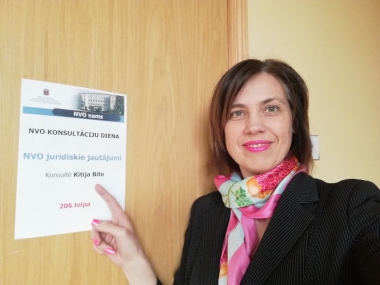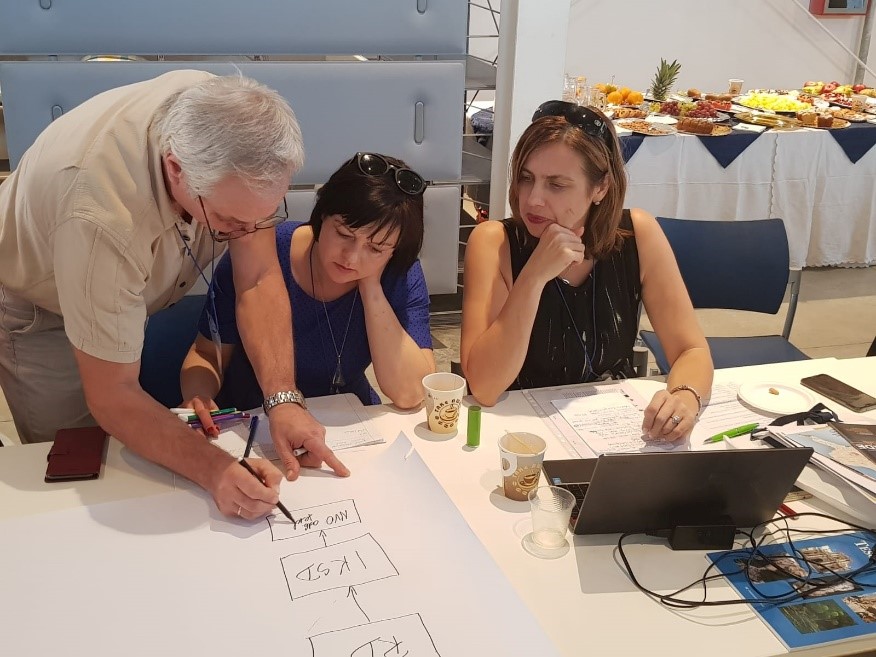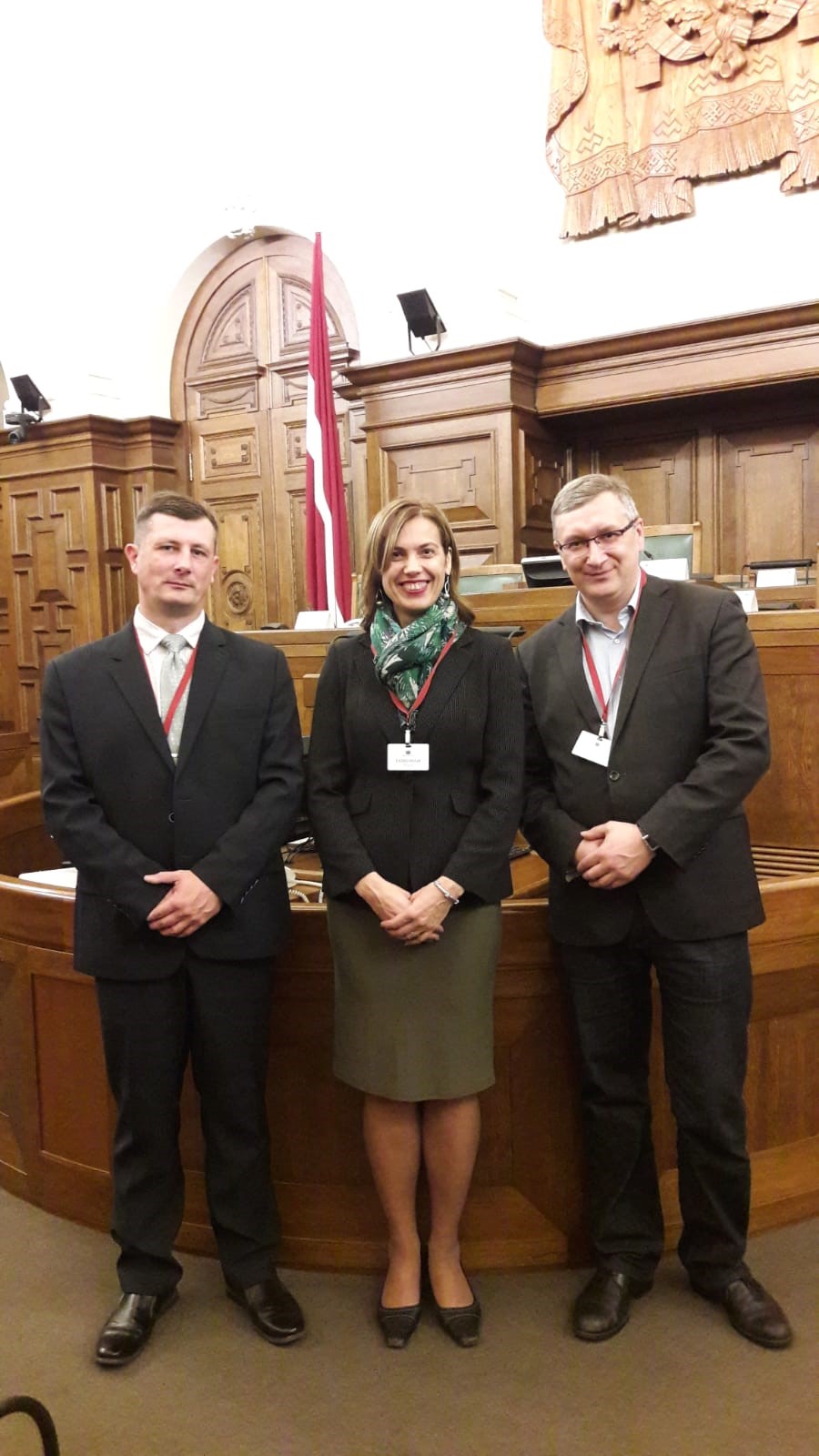What will have changed in the NGO sector in Latvia and society in general after the Covid-19 crisis is over?
Edited on
13 July 2020During the unusual period of Covid-19 crisis, we invited for a conversation Kitija Bite – a doctor of law, member of several non-governmental organisations, faculty member at Latvian institutions of higher education, frequent lecturer at the NGO House and member of the local support group of the URBACT project ACTive NGOs.

Now, when we are going through unusual times, what is changing in the work of NGOs from the legal perspective? What is most relevant for organisations now?
The unusual times are teaching something to all of us and make us take a different, deeper look at things, events, and ourselves. However, from the legal perspective, the NGO work does not change. For some NGOs, the workload has increased, in particular, for those involved in social matters – supporting seniors, caring for patients, educating children and youth. At present, the form of work has changed. Likewise, we should commend volunteers, who help with food deliveries, taking care of daily chores and care for the pets of those, who are in self-isolation or who take distancing very seriously and do not leave their homes. All these activities really help in communication and alleviate the work of state and municipal services. From the legal perspective, it is important to abide by the law and the government’s orders that establish restrictions.
You have been a lecturer at the NGO House since the first year of its activities. What are your observations – how does the NGO sector change, what direction does its development take?
Yes, I have been connected to the NGO House since January 2013. Sometimes it is hard to believe how quickly time has flown, and I have had the possibility, together with the NGO House, to educate others and to educate myself, to provide advice on legal issues, develop good contacts and also find friends in the NGO sector. Likewise, I have had the possibility to appraise the growth of the NGO House. Probably I shall not say anything new by pointing out that we can be proud of the fact that the NGO sector can to use the opportunities provided by the NGO House.
Definitely, the NGO sector has changed; at least I see these changes in the participants of my seminars. At the first seminars, the questions were very general and simple, but now, sometimes, I have to look for specific laws and explore most diverse issues to provide a concrete answer. Thanks to the questions put by the participants of the seminars at the NGO House I have understood how broad this area is and how useful a lawyer’s advice can be. Over the years, “a fan club” of a kind has developed, i.e., activists from NGOs who attend almost all my seminars and are very good support for me because they are always ready to become involved in discussions and share their experience. I really like it when the participants of my seminar, through their own conversations and discussions, find answers to questions, to which I am unable to respond immediately. Of course, there are the traditional questions, which will never change, - how to register and re-register an NGO, how to submit documents to the Enterprise Register, how to draw up articles of association, etc. That is why these seminars are held regularly – annually. In general, the NGO sector is developing towards knowledge.
You responded to the invitation of the NGO House and became involved in the work of the local support group of the URBACT project “The Riga NGO House – Collaboration Platform for Organisations and the Municipality”. What are your reflections on this participation?
I have always emphasised that Latvia has a lot to give to other states of the European Union, not only learn and admire what is going on elsewhere. URBACT is a very good project showing that Latvia can. The Riga NGO House is the leading partner in an international project, in which Riga’s experience is transferred into the experience of other project member states. I had the possibility to participate in the working visit to Siracusa, where we discussed the mechanism of decision-making. During these days it could be genuinely felt that the participants of other countries hold the experience of Riga in very high regard. This could be seen also while visiting the prototype of the NGO House in Siracusa – it is abandoned and nothing happens there, whereas our NGO House is inhabited and filled with colours, sounds, dances, and ideas.
What do I like about the URBACT project? The fact that the Riga NGO House is given the opportunity to develop. Discussions about and work on establishing branches of the NGO House have started. We have had several meetings, where we tried to think about what and how should be organised. My task is not only to generate ideas but also to take care of them legally. Of course, the decision on establishing branches will be adopted by the Riga City Council, but some preparatory work has been done and needs to be continued to show our partners in the URBACT project that Riga has not become bogged down in self-satisfaction, that everything is fine and nice with use but that Riga is developing, that the NGO sector could work even better and more actively.

Participating in an international seminar of the URBACT project in Siracusa
We know that you have become actively involved in the work to improve the Law on Voluntary Work. What are its deficiencies and what important improvements are needed?
I began my volunteer work in 2018, when, as part of a project, there was an idea to organise a seminar for NGO activists on organising volunteer work and related problems. When I started to analyse and interpret the Law on Voluntary Work I understood that each of 10 sections of the Law concealed a problem that hindered reaching the purpose of the law – developing the civil society and promoting voluntary work in Latvia. At the end of 2018, in the framework of the project, we submitted to ministries an opinion regarding the deficiencies that had been identified. Some of the ministries did not respond at all, some gave formal answers. We understood that we should continue this work. In 2019, we submitted to the Saeima an opinion on the problems identified in the Law on Voluntary Work, inviting to start discussions on amendments to the law. At the beginning of March 2020, under the auspices of the Saeima Budget and Finance (Taxation) Committee, a working group was established; it will work on amendments to the Law on Voluntary Work.
The emergency situation brought some changes into the working group’s schedule: it was planned to submit the amendments to the Committee in June so that it would then submit the amendments to the law to the Presidium of the Saeima. Currently, this work has stopped but, definitely, it will be continued.
What are the main issues in organising the volunteer work in Latvia? First of all, the unnecessary and redundant bureaucratic burden that the law imposes upon the NGO sector if volunteers are involved in the NGO work. Reports on the voluntary work hours must be submitted to the State Revenue Service, whereas this Service does not need these reports. In addition to this, the data of the reports must be entered into the system manually. It is not normal that the law sets the obligation to perform activities, which require the work of both the NGO sector and of civil servants, but the reports are meaningless. In Latvia, a ministry responsible for volunteer work has not been defined. In practice, it means that there is no institution that could provide advice in matters of volunteer work, but there are many questions. Volunteer work is not recorded, and we have no idea of its contribution to the economy and the benefit it gives to society in general.
A major problem is insuring volunteers and concluding agreements if the volunteer is a minor. Due to legal nuances and incorrect interpretation of the law, NGOs are reluctant to involve volunteers in their activities, being afraid to violate the law. This situation is not normal. Therefore the law really needs amendments.

Participating in the sittings of the Saeima Committees
Kitija, you are a representative of NGOs yourself. In which NGOs are you involved? Why is it important for you?
Yes, I became involved in an NGO in 2003; it was a professional organisation – the Association of Latvian Border Guards. Currently, I have the status of an inactive member because I am no longer in the service for 9 years.
Since 2008, I am also a member of the Association of Latvian Young Scientists. I served for two terms on the board of the Association. I shall remember this time for its excellent events, long discussions at the Latvian Academy of Sciences, the Saeima Committees and fantastic young scientists. And, again, I have to say – Latvia can! Other countries can be envious of our intellectual potential. We have excellent scientists, who, following studies abroad, return to Latvia and engage in the Association’s activities. I am no longer very actively involved in the activities of this Association since I am approaching the status of a senior member. Let younger and more active emerging scientists shape the future of Latvia’s science.
In 2008, I joined the Association of Latvian Lawyers and I am still active in this Association. Not only because this a professional association, the members of which are qualified lawyers, but also because this Association is actively involved in the process of jurisprudence in the state. Thanks to this Association I can say with full responsibility – changes are possible in the state. Yes, the changes are not instantaneous and time is needed to achieve them, but everything is possible. This Association has delegated me to various commissions and institutions – the Council of the Memorandum, sittings of the Saeima Committees, the committee for selecting the head of KNAB (Corruption Prevention and Combatting Bureau), the Advisory Council of KNAB, etc.
To avoid creating the impression that I am active only in professional organisations, I am also a member of the Latvian Society of Numerology. Studying people’s birth dates and trying to understand causalities in oneself and others is very interesting. Although this education is not formal, the process itself is very fascinating.
After the Covid -19 crisis is over, in your opinion, what will have changed in the NGO sector and society in general? What the lessons and benefits will be?
The NGO sector, to my mind, will attract new members because people will have understood several things. For example, that we are social beings and that it is very important to act together, to support one another. And, where better to do this than in the NGO sector, where everyone can find an activity that corresponds to their interests. I believe that we all shall have understood that the planet that we inhabit needs protection. That we ourselves are to blame for the processes ongoing in the world – ecology, the cult of materialism, political nihilism, living in the “rat race”, without seeing and considering events around us. This crisis gave us the time to reflect, to feel, to explore, to understand, which are and which are not out values. I, for example, have “weeded out” my phone book contacts and Facebook friends. Do I really need quantity?
In conclusion – what would you currently wish to the enterprising and energetic people from the NGO sector?
Engage! One can sit at home in front of the TV and be the world’s best coaches, politicians and ministers. One can blame everyone in all disasters of the world. But it is also possible to join an NGO and do good. Yes, we are not a society, in which patronage and the cult of donation flourishes, but we, definitely, can donate something else – knowledge, time, energy, conversations, thus finding fulfilment in our own lives and helping others.
Thank you for this conversation.
Interviewer: Zinta Gugane, project coordinator of the NGO House
 Submitted by z.biteniece on
Submitted by z.biteniece on
